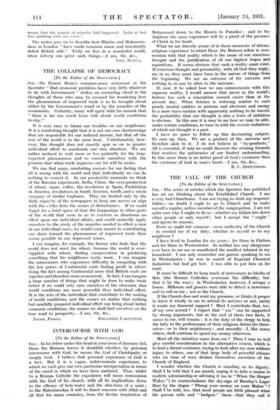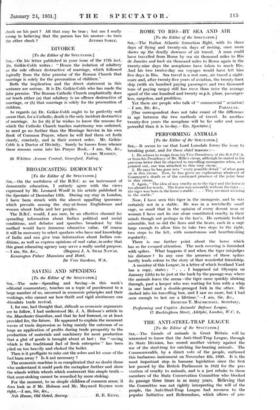THE CALL OF THE CHURCH [To the Editor of the
SPECTATOR.] SIR,—The series of articles which the Spectator has published has set me thinking about the Established Church. T am a very bad Churchman. I am not trying to shirk my responsi- bilities—no doubt I ought to go to Church and to make myself a regular, active member of the congregation,. I am not quite sure why I ought to do so—whether my failure lets down other people or only myself ; but I accept the " ought "
and ignore its reasons. • Even so, ought not someone—sonic authority of the Church —to remind me of my duty, whether to myself or to my neighbour ?
I have lived in London for six years ; for three in Chelsea and for three in Westminster. In neither has any clergyman ever been to see me or manifested the smallest interest in my household. I can only remember one parson speaking to me in Westminster ; he was in search of Imperial Chemical Industries but had got lost. I was able to put him on his road.
It must be difficult to keep track of newcomers to blocks of flats (the Roman Catholics overcome the difficulty, but that is by the way) ; in Westminster, however, I occupy a house. Milkmen and grocers were able to detect a newcomer and to call on me ; not so the Church.
If the Church does not want my presence, or thinks it proper to leave it wholly to me to attend its services or not, surely it wants my financial support ? Must I contribute that, too, of my own accord ? I expect that " yes can be supported by strong arguments, but at the end of them two facts, it seems to me, will remain : it is the duty of the clergy to help the laity to the performance of their religious duties Ito them- selves—or to their neighbours) ; and secondly—I, like many others, shall continue to spend my money otherwise.
Must all the initiative come from me ? Then I may as well give careful consideration to the alternative course, which is to lead a decent existence, trying to look after my awn without injury to others, one of that large body of peaceful citizens who (in time of war) declare themselves members of the Church of England.
I wonder whether the Church is standing on its dignity. Shall I be told that I am merely urging it to take a course in modern salesmanship or advising it (as in "When the Sleeper Wakes ") to counterbalance the sky-sign of Barclay's Lager Beer by the slogan " Plump your money on your Maker " ? Shall I be told, too, that most people are little pleased when the parson calls and " badgers " them—that they call it
cheek on his part ? All that may be true ; but am I -really wrong in believing that the parson has his answer—to turn







































 Previous page
Previous page